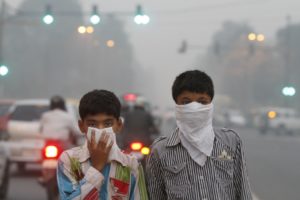The 6th Annual World Air Quality Report has revealed troubling details of the world’s most polluted countries, territories, and regions in 2023.

For this year’s report, data from more than 30,000 air quality monitoring stations across 7,812 locations in 134 countries, territories, and regions were analysed by IQAir’s air quality scientists.
Key findings from the 2023 World Air Quality Report:
- Seven countries met the WHO annual PM2.5 guideline (annual average of 5 µg/m3 or less):
- Australia, Estonia, Finland, Grenada, Iceland, Mauritius, and New Zealand.
- The top five most polluted countries in 2023 were: Bangladesh, Pakistan, India, Tajikstan and Burkina Faso.
- A total of 124 (92.5%) out of 134 countries and regions exceeded the WHO annual PM2.5 guideline value of 5 µg/m3.
- Africa remains the most underrepresented continent, with a third of the population still lacking access to air quality data.
- Climate conditions and transboundary haze were major factors in Southeast Asia, where PM2.5 concentrations rose in nearly every country.
- The region of Central & South Asia was home to the top 10 most polluted cities in the world.
- Begusarai, India was the most polluted metropolitan area of 2023. India was home to the four most polluted cities in the world.
- The most polluted major U.S. city was Columbus, Ohio. Beloit, Wisconsin was the most polluted city in the U.S.
- Las Vegas, Nevada was the cleanest major city in the U.S.
- For the first time in the history of this report, Canada was the most polluted country in Northern America, with the region’s 13 most polluted cities located within its borders.
- 70% of the real-time air quality data in the region of Latin America & Caribbean comes from low-cost sensors.
While the number of countries and regions with air quality monitoring has steadily increased over the past six years, there remain significant gaps in government-operated regulatory instrumentation in many parts of the world. Low-cost air quality monitors, sponsored and hosted by citizen scientists, researchers, community advocates, and local organisations, have proven to be valuable tools to reduce gaps in air monitoring networks across the world.
“A clean, healthy, and sustainable environment is a universal human right. In many parts of the world the lack of air quality data delays decisive action and perpetuates unnecessary human suffering. Air quality data saves lives. Where air quality is reported, action is taken, and air quality improves,” said Frank Hammes, Global CEO, IQAir.
These independent air quality monitoring stations reveal disproportional exposure to harmful air pollution among vulnerable and underrepresented groups. Glaring gaps in air quality monitoring data, where pollution is likely poor, further underline the need to expand air quality monitoring coverage worldwide.
“IQAir’s annual report illustrates the international nature and inequitable consequences of the enduring air pollution crisis.
“Local, national, and international effort is urgently needed to monitor air quality in under-resourced places, manage the causes of transboundary haze, and cut our reliance on combustion as an energy source,” states Aidan Farrow, Sr. Air Quality Scientist, Greenpeace International.
“In 2023 air pollution remained a global health catastrophe, IQAir’s global data set provides an important reminder of the resulting injustices and the need to implement the many solutions that exist to this problem.”
